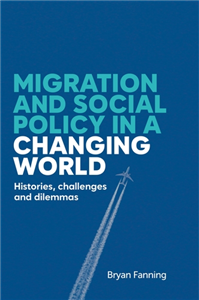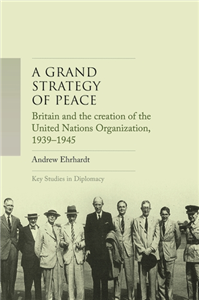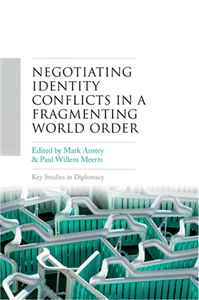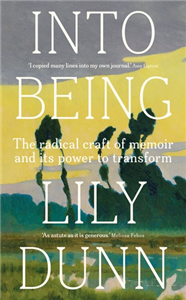Your Search Results
-
World for kids
Our passion is to show kids, how colourful and fascinating the world is. There is not only one way to live but so many. We love curious children and we do the books they need to explore the world. So we do travel books for kids and novels for the journey in a hammock.
View Rights Portal
-
Promoted Content
-
Promoted ContentHumanities & Social SciencesJanuary 2026
Migration and social policy in a changing world
Histories, challenges and dilemmas
by Bryan Fanning
Migration and social policy in a changing world bridges the generally separate fields of social policy and migration studies. This book traces social policy responses to migration from the Industrial Revolution to today's era of globalisation and large-scale migration. Through case studies from across the globe, the book explores key themes including rural-urban migration, social citizenship, welfare internationalism and diasporic care systems. It examines how migrants are included in or excluded from social citizenship in host societies, and how they become providers of welfare services such as health and social care. Moving beyond a methodological nationalist focus, the book investigates migrant incorporation into welfare states through family networks, faith communities, and other informal welfare structures. It combines migrants' experiences with host societies' immigration politics, institutional perspectives and policies to present a comprehensive analysis of the migration-welfare relationship. This volume fills a gap in academic literature and offers policymakers, practitioners and scholars a framework for understanding the interplay between migration and social policy in our changing world.
-
 Trusted Partner
The ArtsOctober 2023
Trusted Partner
The ArtsOctober 2023Windows for the world
Nineteenth-century stained glass and the international exhibitions, 1851–1900
by Jasmine Allen
Windows for the world explores the display and reception of nineteenth-century British stained glass in a secular exhibition context. International in scope, the book focuses on the global development of stained glass in this period as showcased at, and influenced by, these exhibitions. It recognises those who made and exhibited stained glass and demonstrates the long-lasting impact of the classification and modes of display at these events. A number of exhibits are illustrated in colour and are analysed in relation to stylistic developments, techniques and material innovations, as well as the broader iconographies of nation and empire in the nineteenth century.
-
 Trusted Partner
Humanities & Social SciencesJanuary 2013
Trusted Partner
Humanities & Social SciencesJanuary 2013Christian Dualist Heresies in the Byzantine World, c. 650-c. 1450
by Janet Hamilton, Bernard Hamilton
Christian dualism originated in the reign of Constans II (641-68). It was a popular religion, which shared with orthodoxy an acceptance of scriptual authority and apostolic tradition and held a sacramental doctrine of salvation, but understood all these in a radically different way to the Orthodox Church. One of the differences was the strong part demonology played in the belief system. This text traces, through original sources, the origins of dualist Christianity throughout the Byzantine Empire, focusing on the Paulician movement in Armenia and Bogomilism in Bulgaria. It presents not only the theological texts, but puts the movements into their social and political context.
-
 Trusted Partner
Trusted Partner
-
 Trusted Partner
Humanities & Social Sciences
Trusted Partner
Humanities & Social SciencesBrazil in the world
The international relations of a South American giant
by Dr. Sean W. Burgess
Brazil has suddenly become a country of interest to the West, playing a critical role in global economic talks at the G20 and WTO, brokering North-South relations through its new international economic geography, and stepping into regional and global security questions through its activities in Haiti, Paraguay and the nuclear question in Iran. This book explains why Brazil is taking an increasingly prominent international role, how it conducts and plans its regional and global interactions, and what the South American giant intends to do with its rising international influence. The book is written for the non-specialist, providing students and other interested readers with a well-organized, concise introduction to the fundamentals of the foreign policy of an emerging Twenty-First Century power.
-
 Trusted Partner
Humanities & Social SciencesMarch 2017
Trusted Partner
Humanities & Social SciencesMarch 2017Imperialism and the natural world
by John M. MacKenzie
Imperial power, both formal and informal, and research in the natural sciences were closely dependent in the nineteenth century. This book examines a portion of the mass-produced juvenile literature, focusing on the cluster of ideas connected with Britain's role in the maintenance of order and the spread of civilization. It discusses the political economy of Western ecological systems, and the consequences of their extension to the colonial periphery, particularly in forms of forest conservation. Progress and consumerism were major constituents of the consensus that helped stabilise the late Victorian society, but consumerism only works if it can deliver the goods. From 1842 onwards, almost all major episodes of coordinated popular resistance to colonial rule in India were preceded by phases of vigorous resistance to colonial forest control. By the late 1840s, a limited number of professional positions were available for geologists in British imperial service, but imperial geology had a longer pedigree. Modern imperialism or 'municipal imperialism' offers a broader framework for understanding the origins, long duration and persistent support for overseas expansion which transcended the rise and fall of cabinets or international realignments in the 1800s. Although medical scientists began to discern and control the microbiological causes of tropical ills after the mid-nineteenth century, the claims for climatic causation did not undergo a corresponding decline. Arthur Pearson's Pearson's Magazine was patriotic, militaristic and devoted to royalty. The book explores how science emerged as an important feature of the development policies of the Colonial Office (CO) of the colonial empire.
-
 Trusted Partner
Humanities & Social SciencesJuly 2025
Trusted Partner
Humanities & Social SciencesJuly 2025A grand strategy of peace
Britain and the creation of the United Nations Organization, 1939-1945
by Andrew Ehrhardt
A grand strategy of peace is the first detailed account of Britain's role in the creation of the United Nations Organization during the Second World War. As a work of traditional diplomatic history that brings in elements of intellectual history, the book describes how British officials, diplomats, politicians, and writers - previously seen to be secondary actors to the United States in this period - thought about, planned for, and helped to establish a future international order. While in the present day, many scholars and analysts have returned to the origins of the post- 1945 international system, this book offers an exhaustive account of how the statesmen and more importantly, the officials working below the statesmen, actually conceived of and worked to establish a post-war world order.
-
 Trusted Partner
Humanities & Social SciencesAugust 2008
Trusted Partner
Humanities & Social SciencesAugust 2008Time and world politics
Thinking the present
by Kimberly Hutchings, Simon Tormey, Jon Simons
This book offers the first authoritative guide to assumptions about time in theories of contemporary world politics. It demonstrates how predominant theories of the international or global 'present' are affected by temporal assumptions, grounded in western political thought, that fundamentally shape what we can and cannot know about world politics today. The first part of the book traces the philosophical roots of assumptions about time in contemporary political theory. The second part examines contemporary theories of world politics, including liberal and realist International Relations theories and the work of Habermas, Hardt and Negri, Virilio and Agamben. In each case, it is argued, assumptions about political time ensure the identification of the particular temporality of western experience with the political temporality of the world as such and put the theorist in the unsustainable position of holding the key to the direction of world history. In the final chapter, the book draws on postcolonial and feminist thinking, and the philosophical accounts of political time in the work of Derrida and Deleuze, to develop a new 'untimely' way of thinking about time in world politics. ;
-
 Trusted Partner
Humanities & Social SciencesJuly 2006
Trusted Partner
Humanities & Social SciencesJuly 2006India in a globalized world
by Sagarika Dutt, Caroline Wilding
This book looks at India in the context of a globalized world. It starts by looking at the history of Indian civilization, exploring the roots of Indian identity and highlighting processes such as foreign invasions, foreign trade, cultural imperialism, colonial rule and the growth of Indian nationalism. The book examines the gradual democratization of Indian politics. Cultural and ethnic divisions in Indian society are examined in depth, as are the problems that have prevented economic development and stood in the way of economic liberalization. The history of India's integration into the global economy is considered, and the opportunities available to the country in the early years of the 21st century are detailed. The final chapters consider the Indian government's perception of the Indian diaspora, as well as the changing priorities reflected in India's foreign policy since 1947.
-
 Trusted Partner
International relationsDecember 2014
Trusted Partner
International relationsDecember 2014India in a globalized world
by Sagarika Dutt
This book, newly available in paperback, looks at India in the context of a globalized world. It starts by looking at the history of Indian civilization, exploring the roots of Indian identity and highlighting processes such as foreign invasions, foreign trade, cultural imperialism, colonial rule and the growth of Indian nationalism. The book examines the gradual democratization of Indian politics. Cultural and ethnic divisions in Indian society are examined in depth, as are the problems that have prevented economic development and stood in the way of economic liberalization. The history of India's integration into the global economy is considered, and the opportunities available to the country in the early years of the twenty-first century are detailed. The final chapters consider the Indian government's perception of the Indian diaspora, as well as the changing priorities reflected in India's foreign policy since 1947.
-
 Trusted Partner
June 2024
Trusted Partner
June 2024At the Very Bottom of the System
How migrant workers ensure prosperity for us
by Sascha Lübbe
The author reveals structural problems and offers solutions – an urgently necessary book, not least with a view to the acute shortage of skilled workers 450,000 migrant workers toll on German construction sites, work in sometimes inhumane conditions in meat factories or as truck drivers, and let’s not forget the hordes of cleaners in German hotels and companies. They are systematically exploited and cheated out of their wages. Sascha Lübbe exposes the octopus-like network of partly criminal companies in a shadowy world where the boundary between the legal and the illegal is blurred. In his evocative book with interviews with those aff ected, he reveals how a parallel system has established itself in the German working world, but also how those affected resist.
-
 Trusted Partner
Humanities & Social SciencesOctober 2021
Trusted Partner
Humanities & Social SciencesOctober 2021Higher education in a globalising world
Community engagement and lifelong learning
by Peter Mayo
This book focuses on current policy discourse in Higher Education, with special reference to Europe. It discusses globalisation, Lifelong Learning, the EU's Higher Education discourse, this discourse's regional ramifications and alternative practices in Higher Education from both the minority and majority worlds with their different learning traditions and epistemologies. It argues that these alternative practices could well provide the germs for the shape of a public good oriented Higher Education for the future. It theoretically expounds on important elements to consider when engaging Higher Education and communities, discussing the nature of the term 'community' itself. Special reference is accorded to the difference that lies at the core of these ever-changing communities. It then provides an analysis of an 'on the ground project' in University community engagement, before suggesting signposts for further action at the level of policy and provision. This book is relevant to United Nations Sustainable Development Goal 4, Quality education
-
 Trusted Partner
Humanities & Social SciencesDecember 2020
Trusted Partner
Humanities & Social SciencesDecember 2020Creativity and resistance in a hostile world
by Sarita Malik, Churnjeet Mahn, Michael Pierse, Ben Rogaly
-
 Trusted Partner
Humanities & Social SciencesMarch 2026
Trusted Partner
Humanities & Social SciencesMarch 2026Negotiating identity conflicts in a fragmenting world order
by Paul Willem Meerts, Mark Anstey
At every level of human interaction new levels of identity-based tension are in evidence. Contributors to this book explore facets of fragmentation processes within systems of state and interstate organisation, how they influence the use of negotiation, and how negotiation might be used to effect renewed coherence. Following Anstey's (Ch1) introductory chapter framing the nature and shape of fragmentation dynamics, Zartman (Ch 2) argues that the use of negotiation as a process of conflict resolution is deeply shaped by identity groups whose internal coherence is dependent on sustaining a negative identity of others. International relations are no longer solely the realm of experienced diplomats but are shaped as Meerts (Ch3) points out by politicians seeking to be responsive to voting publics rather than wider concerns. Anstey digs into problems of fragmentation (Ch. 4) and Troitskiy (Ch 5) points out how a reluctant acceptance of the power of 'the other' can lead to a form of strategic stability in relations. Anstey and Meerts (Ch 6) point out in their analysis of the Israeli-Palestinian case as an identity conflict turned very bad. Guggenbuhl (Ch 7 ) reveals how structures and processes have been designed within the EU to prevent, contain and regulate conflicts to limit risks of confrontation and fragmentation. Schuessler (Ch 8) to advocates a shift away from a template or roadmap approach to EU membership to a cohesion based on non-dominance. There is still a strong desire on the part of some states, like Northern Macedonia, to become EU members, as reflected in Manton's (Ch 9). Paula Garzon and Frans Schram explain the success of the Colombia Peace Negotiations (Ch 10), while Odigie and da Rocha (Ch 11) analyse the struggle faced by ECOWAS to influence coup leaders in Mali to return to constitutional government and changes of government by constitutional means. Liang (Ch12) discusses how the internet as the modern vehicle of inter-state, inter-group and interpersonal communication has become weaponised. In Ch 13 Anstey draws some lessons from contributions to the compilation.
-
 Trusted Partner
Teaching, Language & ReferenceOctober 2025
Trusted Partner
Teaching, Language & ReferenceOctober 2025Into being
The radical craft of memoir and its power to transform
by Lily Dunn
The acclaimed author of Sins of My Father shares the secrets of writing a new, transformative kind of memoir. Into being is an essential guide to writing memoir in a radical and empowering way. Drawing on her experience as a memoirist and a teacher of creative writing, Lily Dunn presents the ground-breaking idea that the craft of memoir itself can offer a form of transformation. Dunn demystifies the memoirist's art, helping readers to find meaning in raw experience and elevate the personal to the universal. She considers intriguing questions, from why our memories give greater significance to certain events to how we can write honestly without intruding too far into the lives of our loved ones. She also explores how writers are extending the memoir form to create something hybrid, playful and subversive. In an age of social media, filled with confessions, re-inventions and distortions of the self, the question of what it means to be an individual is more urgent than ever. Into being shows readers how to turn writing memoir into a journey of discovery - one that can be shared with the whole world.
-
 Trusted Partner
Humanities & Social SciencesJune 1999
Trusted Partner
Humanities & Social SciencesJune 1999The rise and fall of world orders
by Torbjorn Knutsen
Drawing in lessons from 400 years of Great-Power politics, this volume challenges both the "declinist" arguments and the overstretched hypothesis of Paul Kennedy to develop an alternative approach to the debate on the rise and fall of the Great Powers. The first half of the book compares the Spanish, Dutch and the First and Second British world orders. It identifies their common features in order to find the most salient causes for their rise as world powers, and the most probable reasons for their decline. The second half of the book addresses the American world order in the 20th century, from Pax Americana to the End of US Hegemony. The author sees the dissolution of the Soviet Union and the resurgence of the US as evidence of the role played by normative dimensions, commonly underestimated in International Relations analysis. Theoretically challenging, Knutsen's volume provides a fresh approach to debates in international relations aimed at both students and scholars.
-
 Trusted Partner
Colonialism & imperialismJanuary 2015
Trusted Partner
Colonialism & imperialismJanuary 2015An Anglican British world
by Joseph Hardwick. Series edited by Andrew S. Thompson, John Mackenzie
-
 Trusted Partner
Children's & YA
Trusted Partner
Children's & YAReally Great, Heros! (2). What on Earth are we Doing Here?
by Rüdiger Bertram/ Heribert Schulmeyer
Juli can’t wait for the holidays. His cousin Jenny and he can once more go to her uncle’s Superhero Hotel. Maybe the next superhero adventure will be awaiting them there? Indeed it is: the evil Snakeman has created an army of mutated giant rabbits, whose underground tunnels threaten one city after another with complete collapse. And as the real superheroes are still lazing around at the swimming pool, and Bruce suddenly has to go and defend the world against an alien invasion, it’s once more left to Juli and Jenny to prevent this disaster! Armed with nothing more than a cheap pair of X-ray laser glasses with which they can see through walls, doors and even people’s clothes (villains in underpants – not a pretty sight!). And while Juli is still asking “What on earth are we doing here?” he and Jenny find themselves in the middle of a crazy adventure that takes them all round the world – across the desert, through London, and on to Paris! Can Juli and Jenny stop the evil villain and his giant rabbits in time?
-
 Trusted Partner
Trusted Partner

























